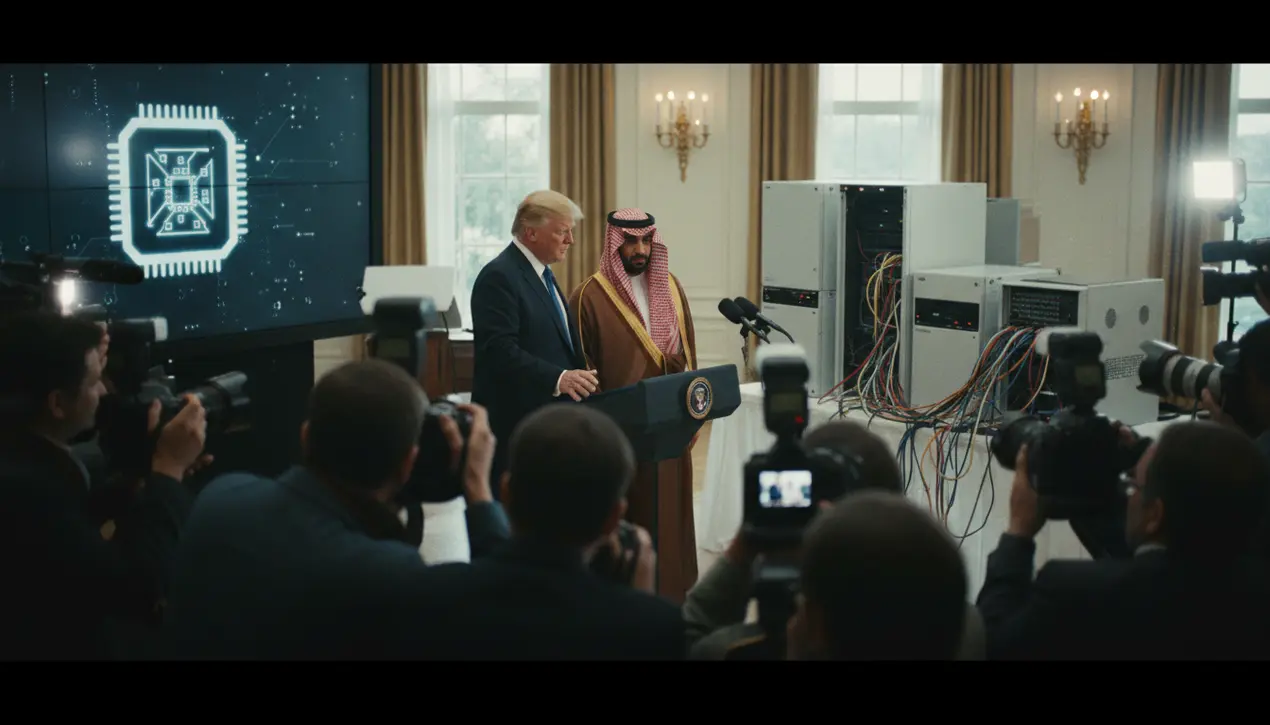
AIchips & hardware
Why Trump’s AI diplomacy is doomed to fail
MI
Michael Ross
2 days ago7 min read5 comments
This week, chips were on the menu in the White House, a development that feels like a scene from a geopolitical thriller where the microchip has become the new oil. When Crown Prince Mohammed bin Salman (MBS) stood beside President Trump at a press conference, he floated a potential $50 billion purchase of American microchips, a statement that immediately triggered the Commerce Department to sign off on exporting 70,000 advanced Nvidia chips to state-owned AI firms in the UAE and Saudi Arabia.The spectacle was complete with Nvidia’s CEO, Jensen Huang, joining a dinner of tech moguls—Elon Musk, Tim Cook, Michael Dell—honoring the Saudi royal, a clear signal of Silicon Valley's deep entanglement with oil-rich Gulf states. This flurry of activity is central to what the Trump administration terms 'AI diplomacy,' a policy bet that the United States can leverage its technological lead in artificial intelligence to compete with China’s sprawling economic influence.Trump himself chimed in, asserting, 'We’re leading by a lot on AI,' while his AI czar, David Sacks, has argued that such chip sales could 'shift the balance of power in the region' and 'box China out of the Middle East. ' Yet, this strategy is fundamentally flawed, reminiscent of Isaac Asimov's fictional worlds where technological control never guarantees political loyalty.The reality is that no quantity of Nvidia chips can persuade Gulf monarchies to decouple from China, because their economic ties are already deeply entrenched. Since 2010, Gulf imports from China have nearly tripled, while those from the U.S. have stagnated, a trend accelerated by the fallout from Trump’s tariffs and China’s relentless manufacturing growth.This isn't just about cheap goods; it extends to critical infrastructure like cellphone networks, solar panels, and even semiconductors—the UAE, for instance, sourced over two-thirds of its semiconductor imports from Chinese firms between 2020 and 2023. Gulf rulers are pursuing ambitious visions of economic transformation, aiming to route global data through the Persian Gulf much like oil, and they rely on Chinese supply chains to build the foundational blocks of their AI ambitions.The UAE has repeatedly annoyed Washington by maintaining close ties with China, including allegations of leaking sensitive U. S.security information, while Saudi entities continue partnering with Hong Kong-based SenseTime on AI projects, despite the firm being under U. S.sanctions for its role in surveilling Uyghurs. This hedging reflects a pragmatic calculus: Gulf states are building compute infrastructure in partnership with China regardless of U.S. actions, as seen when Emirati firm G42 'divested' from Huawei only to transfer holdings to another state-run vehicle overseen by the same royal family.Beyond the geopolitical maneuvering, practical questions loom—can the Gulf even execute these grandiose projects? The UAE's proposed 5-gigawatt Stargate data center would dwarf the largest U. S.installation, while Saudi Arabia's 500-megawatt deal with Musk's xAI exceeds its entire current data center capacity, raising doubts akin to the kingdom's abandoned megaprojects like Neom. Silicon Valley firms may chase these deals, and if structured carefully, they might shore up some U.S. influence alongside China's, but there's no killer app that will pivot the Gulf away from Beijing.The U. S.is essentially placing critical digital infrastructure on a geopolitical fault line, a risky long-term bet that ignores the enduring gravitational pull of Chinese economic integration. In the end, AI diplomacy, as currently conceived, is less a strategic masterstroke and more a high-stakes gamble with diminishing returns, where technology access cannot override the hard realities of global supply chains and regional allegiances.
#AI diplomacy
#US-Saudi relations
#Nvidia chips
#China-Gulf ties
#geopolitics
#featured
Stay Informed. Act Smarter.
Get weekly highlights, major headlines, and expert insights — then put your knowledge to work in our live prediction markets.
Comments
Loading comments...
© 2025 Outpoll Service LTD. All rights reserved.